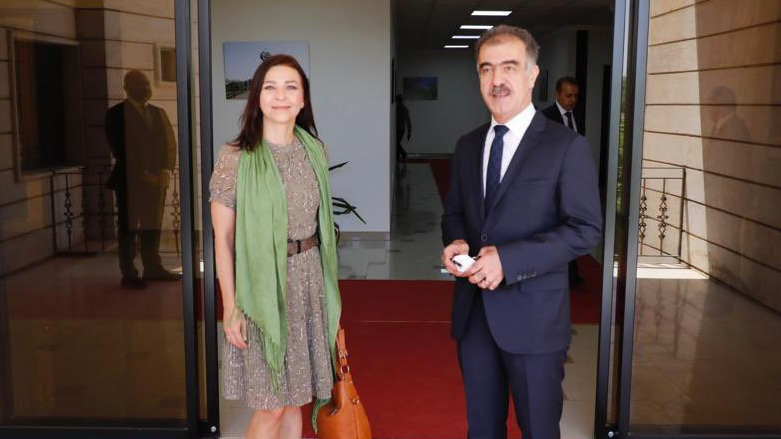Attacks on Kurdistan Region threaten regional security: Austrian MP

ERBIL (Kurdistan 24) – The repeated rocket attacks on the Kurdistan Region threaten regional security, Austrian Parliament's Foreign Affairs Committee and spokesperson for foreign affairs of the Austrian Parliament's Green Group, Dr. Ewa Ernst-Dziedzic, told Kurdistan 24 on Thursday.
Earlier this week, Dr. Ernst-Dziedzic visited northeast Syria and the Kurdistan Region of Iraq and met with local officials.
Received Austrian MP @dziedzic_ewa. We discussed the plight of refugees/IDPs, ensuring a safe and dignified return to their homes, importance of tackling climate & environmental crises, plus KRG's strong commitment to protecting the rights of all ethnic and religious communities. pic.twitter.com/rhTu54G49L
— Safeen Dizayee (@SafeenDizayee) July 5, 2022
The Kurdistan Region has come under repeated Katyusha rocket attacks by groups allegedly affiliated with the Iran-backed Popular Mobilization Forces (PMF).
In June, the Khor Mor gas field in the Kurdistan Region's district of Chamchamal, Sulaimani province, was targeted by three rocket attacks in less than a week.
On June 9, an explosive-laden drone crashed on the Erbil-Pirmam Road, injuring three civilians and damaging vehicles.
Read More: KDP bloc in Iraqi parliament calls for Erbil-Baghdad cooperation against rocket threats
Moreover, on Mar. 13, six ballistic missiles fired from Iran hit the house of Sheikh Baz Karim Barzinji, a prominent Kurdish businessman. The attack also caused substantial damage to the Kurdistan 24 headquarters nearby.
Read More: Kurdistan Presidency calls on the international community to stop terrorist attacks on Erbil
"These attacks from Iran are a crime and pose great threats to the regional security situation," Dr. Ernst-Dziedzic said.
"Of course, this was also a topic of the talks (with Kurdish officials)," she added. "As well as the situation vis-à-vis Turkey, the military actions of the Iraqi army in Sinjar, the situation of refugees, and the challenges posed by climate disasters, especially water shortages, were also discussed."
Dr. Ernst-Dziedzic underlined that the Kurdistan Regional Government (KRG) is facing significant challenges.
"I am convinced that the EU should get more involved here (in the Kurdistan Region), especially in the humanitarian field. As the Austrian Parliament, we will deepen the relationship," she said.
She also discussed the Turkish threats to launch a new operation in northeast Syria.
Since May, Turkish President Recep Tayyip Erdogan has repeatedly said that Turkey is ready to carry out a new operation in northeast Syria.
"The threat of an invasion by Turkey and my conviction that Europe must understand what horrible consequences that would bring was the most current reason for my trip (to northeast Syria)," Dr. Ernst-Dziedzic said.
"But I have been following the developments in Rojava very actively for some time, and this was already my third visit," she added. "The situation, in general, is very tense. The civilian population is more and more desperate concerning the threats from Turkey but also increasingly from ISIS."
She warned that thousands of ISIS prisoners could escape if Turkey launched another operation against the Syrian Democratic Forces (SDF). The SDF had earlier warned a Turkish operation could disrupt their fight against ISIS.
Read More: SDF says Turkey destabilizing region after Erdogan threatens new ground operation
"There are 27 prisons in the area of the cynically named 'security zone'. Released ISIS fighters would be an additional danger in the event of a major attack by Turkey. Thus, the people would be forced to flee," she said.
However, she said she cannot speculate on Erdogan's timetable for an attack.
"With the needed ratification of Sweden's and Finland's NATO accession he has again some kind of a trump card. But there must be no deal with Erdogan on the backs of the Kurds!" she stressed.
Nevertheless, she added that "Austria is neutral, therefore not in NATO, and we will make the threatened violations of international law as strong an issue as possible in Europe."
